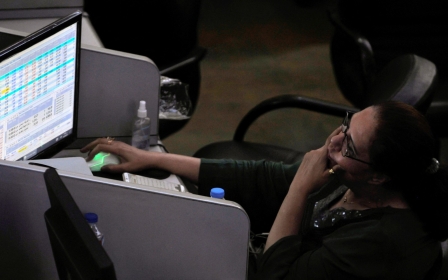War on Gaza: Despite US aid, Israel's economy has been hit hard

In any war, the devastating humanitarian toll and human losses come first in assessing its costs and consequences. Next is the negative impact on the economies of the warring countries.
Since Israel declared war against Gaza on 7 October, its economy has suffered with various sectors in decline. If the Israelis continue to escalate and prolong their military campaign, the global economy will also face negative repercussions, let alone the economy of occupied Palestine.
The Israeli economy is considered an advanced economy in terms of size, per capita income, and other important measures. In 2022, Israel's gross domestic product (GDP) hit about $522bn, larger than the economies of Egypt, Iran, Malaysia, and Nigeria, which are characterised by larger populations and natural wealth.
Israel's per capita GDP is $55,000 annually and is higher than some major developed countries such as the United Kingdom, France, and Germany. It is higher than several oil-rich Arab countries such as Saudi Arabia, Kuwait, and even the UAE.
The Israeli economy has witnessed a significant qualitative and quantitative leap over the past two decades. Among the advanced industrial countries (except for China), the growth in the Israeli economy per the World Bank was the highest, surpassing the growth of the US economy, the Eurozone, and Japan from the years 2000 to 2022, with Israel's economy tripling in size during this period.
New MEE newsletter: Jerusalem Dispatch
Sign up to get the latest insights and analysis on Israel-Palestine, alongside Turkey Unpacked and other MEE newsletters
One of the most important reasons for this significant growth was the tremendous development in the technology sector, which earned a reputation as the world’s second-largest tech centre outside of Silicon Valley.
Israel's tech sector contributes a fifth of the country's output and constitutes more than 50 percent of its total exports. Unsurprisingly, it will be the sector most affected by the ongoing war.
Costs of war
There are direct and indirect costs of Israel's war. The direct expenses refer to the hot cash losses the country incurs every day, leading the government to seek $6bn in loans with a high and unusual interest rate to fund its aggression.
This includes but is not limited to: the daily cost of weapons, ammunition, tools, and supplies; wages and salaries of the reserve forces, who left their jobs to join Israeli forces and fight in Gaza; and damages, depreciation, and maintenance of military machinery like tanks, vehicles, and planes.
As for the indirect expenses, the war has negatively affected several economic sectors such as industry and technology, tourism, and the labour force.
Follow Middle East Eye's live coverage for the latest on the Israel-Palestine war
Globally, Israel is recognised as a high-tech economy, with technology sector exports amounting to more than $80bn annually. The war will hurt this important sector in many ways.
As one example, the Israeli military summoned 350,000 reserve soldiers, a large portion of whom work in the technology sector. Failure to carry out duties will lead to noncompliance with contracts signed with Israeli tech companies. Many of these contracts are with governments and countries around the world, which will put pressure to limit foreign currency flows into their economies.
The war has negatively affected several economic sectors such as industry and technology, tourism, and labour
About 500 multinational companies are investing in Israel's technology sector, including Microsoft, IBM, Intel, Google, Nvidia, and many others. These companies may reconsider continuing their investments in an unstable country like Israel.
Tomer Simon, the chief scientist at Microsoft Israel Research and Development Centre, recently expressed these concerns in a letter to Israeli National Security Advisor Tzachi Hanegbi. Simon stated that Israel must create a positive horizon for multinational companies to grow and continue their work. He warned that for every job in the technology sector, five support jobs are created, and that the Israeli economy should not turn into an economy based on orange production.
Intel, the Silicon Valley giant and first multinational company to launch its operations in Israel in 1974, announced in July a "record deal" with an Israeli factory to build a production unit for chips and semiconductors for $25bn. This plan may be affected by the war and current instability in the region. Intel has not yet commented on the matter and its spokesperson declined to say whether chip production has been affected by the situation.
The defence industry, another one of Israel's major export sectors, will also be harmed as all local production is directed to the troops in the battle. This will cause a serious bottleneck in production output and fulfilling contracts with the rest of the world.
As a religious site, Jerusalem used to receive thousands of pilgrims, particularly during the Christian holidays. The Old City of Jerusalem is deserted according to merchants and businesspeople there. Hundreds of tourists have cancelled their reservations and the risky conditions led the US State Department to issue a level-three travel advisory warning tourists to reconsider travel to Israel.
The situation is being compared to pandemic-era closures. Except for El Al, no airlines are serving Ben Gurion Airport. One can imagine the volume of job losses and the drop in inward foreign currency, taxes, and many other income sources.
With hundreds of thousands of reserve soldiers summoned to war, and 120,000 Palestinian workers losing their work permits, the labour sector has also been deeply affected. To fill this gap, the vacant positions have to be occupied by labourers from overseas, but many of those who were here, such as those from Thailand, have left following the 7 October Hamas-led attacks.
As a result, from the early days of the war, Israel announced that it would replace its Palestinian workers with recruits from countries like India. The need for more expat workers burdens the country with outward foreign currency flows, plus other necessary costs associated with expat employment such as accommodations and airfares.
US bailout
As soon as Israel began its bombing campaign, US lawmakers raced to approve additional military and economic aid to America's closest "ally".
The Biden administration further submitted an additional aid bill worth $105bn to both Ukraine and Israel, and other expenses related to American national security. Israel’s share of this package amounts to about $14bn.
Investors are not willing to invest their money in a country that has been involved in more than six wars over the past 17 years
The debate in the US Congress was tense regarding the approval of this package, as Republicans sought to link it to strict border measures to prevent illegal immigration. Meanwhile, a small group of Democrats, in addition to independent Senator Bernie Sanders, insist that additional aid to Israel be conditional on reducing the number of civilian casualties in Gaza and facilitating the entry of humanitarian aid there.
These conditions are not guaranteed, given the historical behaviour of the Israeli occupation state, as was explicitly expressed by Senator Tim Kaine, who said: “No matter what, we’re going to do a robust aid package for Israel, but it’s got to be consistent with humanitarian aid, and also efforts to reduce the suffering of Gazans who aren’t part of Hamas.”
This aid package, however, remains specific to the war effort, but what about the disastrous consequences on the Israeli economy?
In its early stages, the Israeli Ministry of Finance estimated the cost of the war to be about $50bn. But now that the war is protracted, which Israel is not accustomed to, the Israeli economy is expected to incur far greater costs over the coming period, to the extent that some economists even suggested that it could reach $400bn over the next decade.
Urgent American aid may help partially, but the damage to the economy has been done. In the end, stability and security are necessary for the continued growth of the economy. Investors in general are not willing to invest their money in a country where sirens continuously sound, and a state that has been involved in more than six wars over the past 17 years.
Add to the above losses, Israel is losing its global reputation as a democratic state due to its destruction of the Gaza Strip by the indiscriminate bombing of people, animals, and infrastructure.
In parallel, there is a clear rise of pro-Palestinian sympathy with more than 20,000 civilian casualties, the majority of whom are women and children; the displacement of almost two million people in Gaza who have no place to go; and who had already been living under siege for nearly two decades with the unemployment rate among the highest in the world.
The views expressed in this article belong to the author and do not necessarily reflect the editorial policy of Middle East Eye.
This article is available in French on Middle East Eye French edition.
Middle East Eye delivers independent and unrivalled coverage and analysis of the Middle East, North Africa and beyond. To learn more about republishing this content and the associated fees, please fill out this form. More about MEE can be found here.





